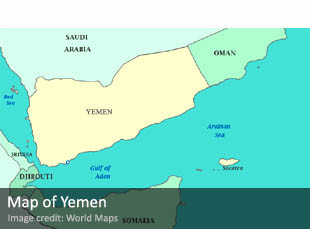Yemen’s Shiite Rebels Are Not Iran Proxies: US Intelligence Officials

American intelligence officials have cautioned against the popular narrative that Yemen’s Shiite rebels are proxies or Iran, noting that Tehran actually counseled them against conquering Yemeni capital Sana’a last year. Known as Houthis, the group formally calls itself Ansar Allah (Supporters of God) and consists almost exclusively of Zaidi tribesmen, who follow an obscure form of Shia Islam. Their denomination, which distinguishes them from Yemen’s Sunni majority, shapes their ethnic identity and has helped fuel their 20-year insurgency against the Yemeni state. In September of last year, Houthi rebels, taking advantage of the chaos caused by the spillover of the Arab Spring into Yemen, marched into Sana’a, which had been virtually abandoned by the government’s security forces, and took it over.
The surprising move caused many in the Middle East to accuse Iran, whose Shiite government maintains strong religious and ideological connections with Yemen’s Zaidi community, of using the Houthis as a proxy army in order to destabilize Saudi Arabia’s southern regions. The latter are also populated by Shiite tribes, who are ethnically affiliated with the Houthis and view Iran as a kind of spiritual homeland. In Washington, the alleged Iranian link to the Houthi insurgency has been pointed to repeatedly by lawmakers opposed to the recent agreement between the Islamic Republic and a group of nations that have come to be known as P5+1, representing the five permanent members of the United Nations Security Council plus Germany. The lawmakers argue that, while nominally agreeing to end its nuclear program, Tehran has been secretly conspiring to destabilize the entire Arabian Peninsula.
However, a report in online news agency The Huffington Post said on Monday that American intelligence officials are far from convinced that Iran is actually directing the Houthi insurgency. Citing “American officials familiar with intelligence” operations in Yemen, the New York-based news agency said Iran actively opposed the Houthis’ advance on the Yemeni capital in September of last year, and tried to prevent it. The Houthis, however, simply ignored Tehran’s advice and took over Sana’a. The Huffington Post quotes one unnamed American intelligence official who says that “it is wrong to think of the Houthis as a proxy force of Iran”. The article also quotes Bernadette Meehan, spokeswoman for the United States National Security Council, who says that “it remains [the NSC’s] assessment that Iran does not exert command and control over the Houthis in Yemen”.
If it is accurate, the US intelligence assessment would mean that Tehran is far more interested in promoting its agreement with the P5+1 than commandeering a proxy war in Yemen. Additionally, those who suggest that Yemen’s Houthis are guided by Iran appear to ignore the fact that the Zaidis follow a branch of Shiite Islam that differs markedly from Iran’s. Knowledgeable observers have pointed out that the Houthi insurgency is far more concerned with combatting local government corruption and having a say in the country’s internal power struggles than promoting Shiite Islam in Yemen and beyond.

